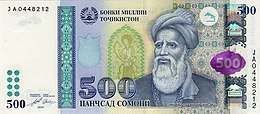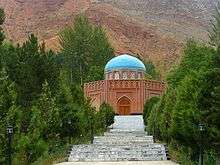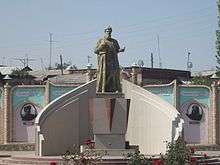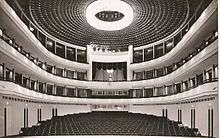Rudaki
Abū 'Abd Allāh Ja'far ibn Muḥammad al-Rūdhakī (Persian: ابوعبدالله جعفر بن محمد رودکی; born c. 859, Rudaki, Khorasan—died 940/941), better known as Rudaki (رودکی), and also known as "Adam of Poets" (آدمالشعرا), was a Persian poet[1][2][3] regarded as the first great literary genius of the Modern Persian language.
.jpg) Rudaki statue in Dushanbe, Tajikistan | |
| Native name | |
| Born | Abū 'Abd Allāh Ja'far ibn Muḥammad al-Rūdhakī c. 859 Rudak, Samanid Empire (present day Tajikistan) |
| Died | 941 (aged 83) Rudak, Samanid Empire |
| Pen name | Adam of Poets Persian: آدمالشعرا |
| Occupation | Poet |
| Language | Persian |
| Genre | Persian poetry |
| Subject | Persian revivalism |
| Notable works | Lament in Old Age Mother of Wine Kalila va Dimna |
Rudaki composed poems in the modern Persian alphabet and is considered a founder of classical Persian literature. His poetry contains many of the oldest genres of Persian poetry including the quatrain,[4] however, only a small percentage of his extensive poetry has survived. As it seems, Rudaki was the first person to combine different roles that were yet distinguishable entitles in the 9th century royal court: musician, poet and declaimer/reciter, and copyist.[5]
Biography
Early Years

Rudaki was born in 859 in Rudak (Khorasan),[6] a village located in the Samanid Empire which is now Panjakent, located in modern-day Tajikistan. Even though most of his biographers assert that he was completely blind, some early biographers are silent about this, or do not mention him as having been born blind. His accurate knowledge and description of colors, as evident in his poetry, renders this assertion very doubtful.
At the Samanid court
Early in his life, the fame of his accomplishments reached the ear of the Samanid king Nasr II ibn Ahmad, the ruler of Khorasan and Transoxiana, who invited the poet to his court. Rudaki became his daily companion. Over the years, Rudaki amassed great wealth and became highly honored. Some feel he deserves the title of "father of Persian literature", or the Adam or the Sultan of poets even though he had various predecessors, because he was the first who impressed upon every form of epic, lyric, and didactic poetry its peculiar stamp and its individual character. He is also said to have been the founder of the diwan, which is the typical form of the complete collection of a poet's lyrical compositions in a more or less alphabetical order, which all Persian writers use even today. He was also a very adept singer and player on the chang (harp).[7]
Later career
He was the court poet to the Samanid ruler Nasr II (914–943) in Bukhara, although he eventually fell out of favour in 937 CE. Towards the end of his life, he lived in poverty, and at the same time his poetic style also gained a touching melancholy.[6] He died in 940/941 CE, leaving behind approximately 100,000 couplets, out of which fewer than 1,000 have survived.[6]
Poetry
His poems are written in a simple style, having optimism and charm, but as he gets close to end of his life, a touching melancholy gets developed in his poetry.[6] A sample of his poetry, translated into English:[4]
- Look at the cloud, how it cries like a grieving man
- Thunder moans like a lover with a broken heart.
- Now and then the sun peeks from behind the clouds
- Like a prisoner hiding from the guard.
The high frequency of Shu'ubiyya thoughts in Rudaki poems is to such an extent that he can be seen as a comprehensive representative of Shu'ubiyya thoughts among Persian-language poets. He has relied more on those thoughts that the foundations of Shu'ubiyya thoughts were established over, like: racial equality; freedom of Iranians; honoring the rich historical and social background including legendary, mythical, and national heroes that Arabs were naturally lacking them, purposeful revival of feasts and ceremonies of pre-Islamic era, scientism, rationalism, and emphasis on human free will, all of which under a circumstance that Baqdad was dominated by Ashʿarians, and also emphasis on vinosity and hedonism as an Iranian practice that had remained from pre-Islamic era.[8]
Works
Of the 1,300,000 verses attributed to him,[9] only 52 qasidas, ghazals, and rubais survived; of his epic masterpieces we have nothing beyond a few stray lines in native dictionaries. However, the most serious loss is that of his translation of Abdullah Ibn al-Muqaffa's Arabic version of the old Indian fable book Kalila and Dimna (Panchatantra), which he put into Persian verse at the request of his royal patron. Numerous fragments, however, are preserved in the Persian lexicon of Asadi Tusi (the Lughat al-Furs, ed. P. Horn, Göttingen, 1897). In his qasidas – all of which are devoted to the praise of his sovereign and friend – unequaled models of a refined and delicate taste, very different from the often bombastic compositions of later Persian encomiasts, have survived. His didactic odes and epigrams expressed in well-measured lines a type of Epicurean philosophy of life and human happiness, and more charming still are the purely lyrical pieces that glorify love and wine.
There is a complete edition of all the extant poems of Rudaki that were known at the end of the 19th century, in Persian text and metrical German translation, together with a biographical account, based on forty-six Persian manuscripts, in Hermann Ethé's Rudagi der Samanidendichter (Göttinger Nachrichten, 1873, pp. 663–742); see also:
- Neupersische Literatur in Wilhelm Geiger's Grundriss der iranischen Philologie
- Paul Horn, Geschichte der persischen Literatur (1901), p. 73
- E. G. Browne, Literary History of Persia, (1902)
- C. J. Pickering, A Persian Chaucer in National Review (May 1890).
More recently, in 1963, Saʻīd Nafīsī identified more fragments to be attributed to Rudaki and has assembled them, together with an extensive biography, in Muḥīṭ-i zindagī va aḥvāl va ashʻār-i Rūdakī.
Personal life
The common opinion was that Rudaki was born blind or was blind from his childhood. However, some of early biographies, including Samani and Nezami Aruzi, do not characterize his blindness as natural-born. Ferdowsi mentions in his Shahnameh that they recited Kelileh o Demneh to him and he rendered it into a poem. Also, some of his poems seem to support the idea that he had sight:
پوپک دیدم به حوالی سرخس
بانگک بر بُرده به ابر اندرا
چادرکی رنگین دیدم بر او
رنگ بسی گونه بر آن چادرا
pupak didam be havâli Saraxs
bângak bar borde be abr andarâ
čâdaraki-ye rangin didam bar u
rang-e basi gune bar ân čâdarâ
I saw a bird near the city of Sarakhs
It had raised its song to the clouds
I saw a colorful chador on it
So many colors on its chador
The contemporary Iranian scholar, Said Nafisi, has a book about Rudaki called Biography, Environment and Time of Rudaki. On pages 394–404, he refers to historical events and references in Persian books and poems, as well as the forensic findings of Russians in the early 20th century, including Mikhail Gerasimov (who reconstructed Rudaki's face based on his bones found in his tomb, see above picture), concludes that Rudaki and Amir Nasr Samani were Ismailis and there was a revolt against Ismailis around 940, a few years before Rudaki's death. This revolt led to the overthrow of the Samanid king, and Rudaki, as his close companion, was tortured and blinded and his back was broken while they were blinding him. After this, Rudaki went back to the small town where he was born, died shortly after that, and was buried there.
Legacy
Rudaki while describing himself says "[he was a poet] whose poems were heard by the world", and Bal'ami the elder a famous historian says "there is no one like Rudaki, in Arab or Ajam [Persians]".[10] Rashidi Samarqandi says "I counted his poems, it was one million and three hundred thousand".[10]
For the 1100th anniversary of his birth, the Iranian government published a series of stamps showing his picture. An international seminar was held at Vahdat Hall, Tehran, Iran on 21 December 2008, to mark his 1150th birth anniversary, with President Ahmadinejad and the Culture minister of Tajikistan in attendance.[11] In this seminar, Rudaki was celebrated as the father of modern Persian literature.
Asteroid 90806 Rudaki, discovered by Italian astronomer Silvano Casulli in 1995, was named in his memory.[12] The official naming citation was published by the Minor Planet Center on 5 October 2017 (M.P.C. 106502).[13]
Books about Rudaki
- Sadruddin Eini and Seminov. Professor Rudaki (in Persian and Latin), Stalinabad 1940
- Rudaki (in Russian) with the introduction of ES Braginsky, translated by Dzhavin, Stalinabad 1955.
- M. Zand. The author of the Quran is Master Rudaki, (in Persian and Cyrillic) - Stalinabad 1957.
- Abdul Ghani Mirzayev. Rudaki and the development of lyric poetry in the evenings of 10-15 (in Tajik Persian), Stalinabad 1957.
- Abdul Ghani Mirzayev. Sample of folklore in Rudaki, (in Tajik Persian) - Stalinabad 1958.
- Poopak NikTalab. Sarve Samarghand (Cedar of Samarkand), continuous interpretation of Rudaki's poems ,Tehran 2020, Faradid Publications[14]
Gallery
 Rudaki's Tomb in Panjrud near Panjakent after restoration
Rudaki's Tomb in Panjrud near Panjakent after restoration- Rudaki Park, Dushanbe, Tajikistan
 Statue of Rudaki in Istravshan, Tajikistan
Statue of Rudaki in Istravshan, Tajikistan Roudaki Hall, Tehran, Iran
Roudaki Hall, Tehran, Iran
References
- Seyed-Gohrab, Ali Asghar (14 October 2011). Metaphor and Imagery in Persian Poetry. BRILL. p. 18. ISBN 978-90-04-21764-5.
- "About Persian (Farsi)". www.soas.ac.uk. Retrieved 12 June 2019.
A notable feature of Persian is the small extent to which it has changed over the thousand years or more of its existence as a literary language. For example, a modern reader should have no difficulty in reading and comprehending the poems of Rudaki, the first Persian poet of note, who died in the year AD 940.
- Britannica "Rūdakī Persian poet"
- Sassan Tabatabai, "Father of Persian Verse: Rudaki and His Poetry", Amsterdam University Press, Feb 15, 2011.
- "IRAN viii. PERSIAN LITERATURE (2) Classical – Encyclopaedia Iranica". www.iranicaonline.org. Retrieved 24 March 2019.
- "Rūdakī | Persian poet". Encyclopedia Britannica. Retrieved 24 March 2019.
- M. S. Asimov, C. E. Bosworth, The Historical, Social and Economic Setting, Motilal Banarsidass Publ., 1999. "From his early years, Rudaki's poetic gift, his fine voice and his skilled playing on the chang (a harp-like musical instrument) made him popular".
- "اندیشه های شعوبی در شعر رودکی / محمدرضا یوسفی". cgie.org.ir. Retrieved 24 March 2019.
- An invitation to Persian poetry : a bilingual text, Persian-English. Saberi, Reza, 1941- (First ed.). Los Angeles: Ketab Corp. 2006. p. 290. ISBN 1595840907. OCLC 71801236.CS1 maint: others (link)
- "رودکی؛ شاعری که حافظ در وصفش سرود- اخبار رسانه ها - اخبار تسنیم - Tasnim". خبرگزاری تسنیم - Tasnim (in Persian). Retrieved 25 March 2019.
- "Picture of the day". Tehran Times. 21 December 2008. Retrieved 29 May 2019.
- "(90806) Rudaki". Minor Planet Center. Retrieved 23 January 2020.
- "MPC/MPO/MPS Archive". Minor Planet Center. Retrieved 23 January 2020.
- "Рӯдакӣ", Википедия (in Tajik), 22 July 2020, retrieved 24 July 2020
Sources
- E. G. Browne. Literary History of Persia. (Four volumes, 2,256 pages, and twenty-five years in the writing). 1998. ISBN 0-7007-0406-X
- Jan Rypka, History of Iranian Literature. Reidel Publishing Company. 1968 OCLC 460598. ISBN 90-277-0143-1
- Chisholm, Hugh, ed. (1911). . Encyclopædia Britannica (11th ed.). Cambridge University Press.
- Sassan Tabatabai, "Father of Persian Verse: Rudaki and His Poetry", Amsterdam University Press, February 15, 2011
External links
| Wikiquote has quotations related to: Rudaki |
- Rudaki, Abu Abd Allah, a biography by Professor Iraj Bashiri, University of Minnesota. Includes translations of "Lament in Old Age", "Mother of Wine", and "Ju-yi Muliyan."
- Roudaki's Lyre; performed by National Choir of Persia in 1976 (Video)
- Rudaki on Iranian Yellow Pages